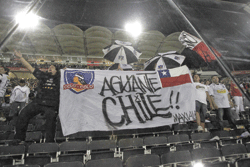
Football is playing its part in trying to help the country return to normal after the recent disaster
After the massive earthquake that devastated a large area of the country and caused losses estimated at £20billion, Chile is gradually picking up the pieces.
For some people, going to a football match is part of the healing process, and leading local club sides Universidad de Chile and Universidad Catolica gave their fans something to cheer about as the two Santiago rivals drew 2-2 in an exciting Libertadores Cup game played in the northern city of Coquimbo – the first game to be staged in the country since those dreadful events of February 27.
A 2-1 victory over Brazilian champions Flamengo then put Universidad de Chile on top of Group 8, but for a brief time it looked as if Chile might suffer the same fate this year that befell Mexico last year.
In 2009, South American teams were given the option of not going to Mexico for the away leg of their Libertadores Cup last-16 ties because of the swine flu epidemic in the country. They chose not to and were all given a bye into the quarter-finals.
Flamengo had sought a similar decision from CONMEBOL on visiting Chile while there were still fears of further tremors. However, they were told flatly that the matches in Chile would go ahead.
Universidad de Chile’s Uruguayan coach Gerardo Pelusso was scathing towards the Brazilian side, claiming: “Flamengo’s move sounds to me like strategy. The Brazilians are not only very good at football, they also have a very good sense of timing: they know when to laugh, when to give the cameras a little kiss, they know how to make your life impossible when they play in Brazil, they know how to be nice when it suits them. I don’t believe anything they say.”
The game was played in Santiago, which was only marginally affected by the earthquake, and Colo Colo lent their Monumental stadium to arch-rivals Universidad de Chile because Vina del Mar, where La U had been playing for the past five months while the Nacional stadium was being refurbished, suffered quake damage.
Flamengo flew south from Rio de Janeiro to Porto Alegre the day before the game and on to Santiago the following day, arriving less than four hours before kick-off and leaving immediately after the game.
Single tournament
The domestic league resumed on the weekend between the two Libertadores games after the Chilean football association (ANFP) announced a changed format for the season. Having playing two separate championships – apertura and clausura – every year since 2002, this season there will be a single tournament with teams meeting each other twice, home and away, in the traditional manner.
There are still complications due to the state of clubs in the most affected areas of the quake, including Universidad de Concepcion from Chile’s second largest city, which was close to the epicentre of the quake and suffered immense damage and the loss of hundreds of lives.
Matches have been postponed while these clubs pick themselves up, get their grounds back in shape and, in some cases, cope with the loss of foreign players who chose to return to their home countries.
Ex-Argentina midfielder Claudio Husain, a 35-year-old free agent who had only been with Audax Italiano since January, rescinded his contract, while Uruguayan defender Federico Perez has left Everton. However, neither was a first-team regular.
Colombian midfielder Macnelly Torres, who plays for Colo Colo, denied he was leaving after reports claimed his wife wanted to go home.
“I never said I’m leaving because of the earthquake or tremors,” he told a local radio station. “It’s a very big lie.
I have to say this because it’s the truth.
“Obviously I sent my family (home) because I live in a flat and my wife got a bit nervous about everything and for me it was better for my family to be in Colombia.”
He said a meeting with the club authorities had been arranged before the quake, adding: “It had nothing to do with the earthquake…I want to look at the possibility of leaving and improving, economically and football-wise.”
Training sessions were at times called off because of tremors and players from second division Rangers suspended training in solidarity with six members of their squad who were left homeless by the earthquake.
Federation president Harold Mayne-Nicholls said Chile would be able to work towards staging the 2015 Copa America despite the quake damage. Brazil, who hold the World Cup in 2014 and the Olympic Games in 2016, have said they would postpone their right to stage the South American championship. They should have succeeded next year’s hosts Argentina.
One big question still to be answered is how will the disruption to domestic football in Chile affect the national team’s performance at the World Cup?
It has certainly disrupted coach Marcelo Bielsa’s build-up. A double-header warm-up against North Korea and Costa Rica, scheduled for March 3, the week after the quake, was cancelled. Meanwhile a friendly against Venezuela was arranged for March 31 in Temuco, a city in the southern part of the country hit by the earthquake. The national team are also due to meet Mexico on May 16.






